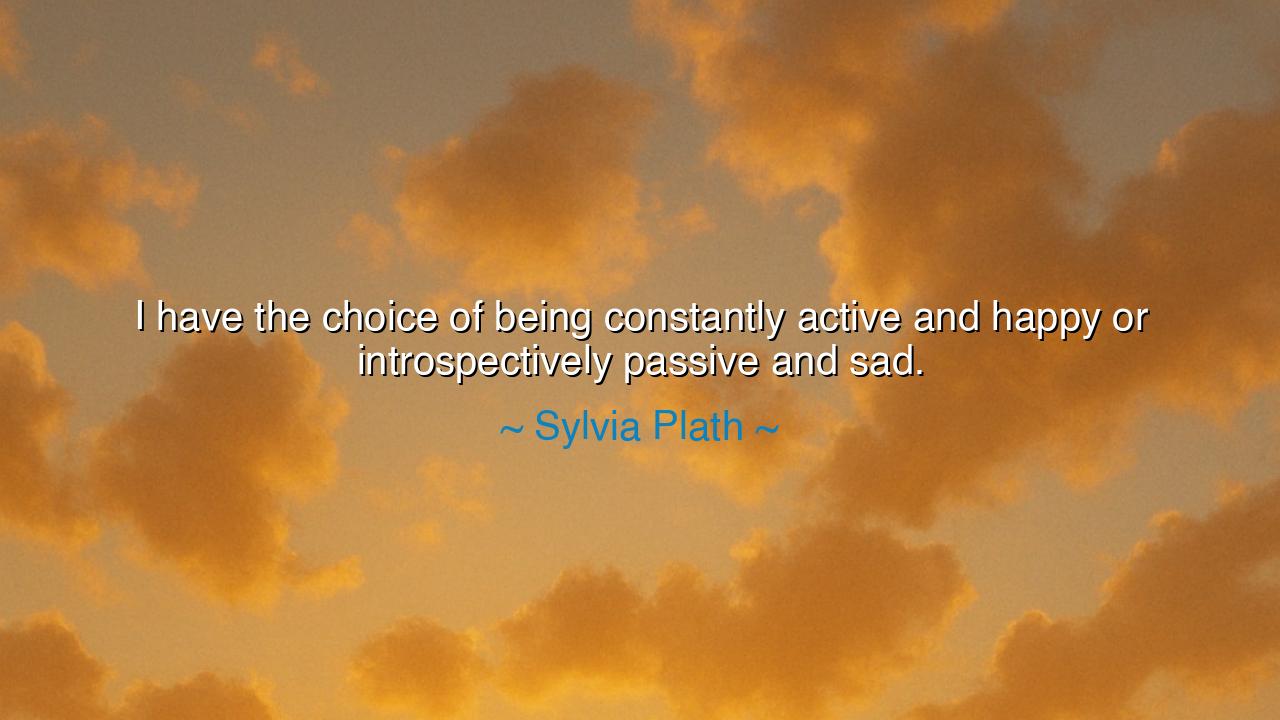
I have the choice of being constantly active and happy or
I have the choice of being constantly active and happy or introspectively passive and sad.






The words of Sylvia Plath, “I have the choice of being constantly active and happy or introspectively passive and sad,” emerge from the depths of a soul that wrestled ceaselessly with itself — a mind divided between movement and stillness, joy and melancholy, the outer world and the inner abyss. In this single sentence, she captures the eternal struggle of the human spirit: the desire to find meaning through action, and the danger of being consumed by reflection. It is not merely a confession, but a revelation — that our state of being is shaped by the direction of our energy. When we engage with life, we find light; when we retreat too long into the corridors of thought, we risk the shadows that dwell there.
To understand Plath’s words, one must first understand the kind of soul she was — brilliant, introspective, and intensely alive. Her writing, from her poetry to The Bell Jar, revealed a consciousness that burned too brightly to rest. Yet she also knew the weight of her own mind, the way thought can become a prison when not balanced by the breath of the outside world. Her statement is a paradox born of experience: she recognizes that happiness is not a gift that descends upon us, but a state that must be chosen and cultivated through motion, through creation, through participation in the living world. To be “constantly active” is not to escape sadness, but to transmute it — to channel it into the rhythm of life before it hardens into despair.
In this, Plath speaks to one of the oldest lessons of philosophy. The Stoics taught that the soul must not be left idle, for idleness feeds the darker impulses. Seneca, writing in his letters, warned that “to be idle is to be at the mercy of one’s passions.” He, too, understood what Plath expressed centuries later: that the human mind, left alone with its own storm, will turn upon itself. Action, in its purest sense, is not mere busyness — it is engagement with purpose, a reaching outward toward meaning. To live actively is to resist the slow decay of the spirit that comes from too much introspection without motion.
Yet there is tragedy in her observation, for Plath does not dismiss introspection entirely. She calls it “introspectively passive,” not inherently evil but dangerous when untethered from the balance of life. Reflection, after all, is the source of wisdom; it allows the mind to deepen, to see clearly. But when reflection turns to rumination — when it no longer serves life but consumes it — then sadness becomes its constant companion. The ancients knew this duality well. The philosopher Aristotle wrote that “no great mind has ever existed without a touch of madness,” acknowledging that those who see too deeply into the fabric of existence often suffer under its weight. Plath’s insight belongs to this lineage — the understanding that awareness, though noble, can wound as much as it enlightens.
One might think of Vincent van Gogh, who, like Plath, lived in the burning tension between creation and collapse. When he painted, he was alive — his sadness transformed into strokes of color, movement, light. But in his stillness, when the brush fell silent and the world receded, his thoughts grew heavy and cruel. His tragedy was not that he felt too little, but that he felt too much — and that his introspection, unanchored by external engagement, led him into despair. Plath’s quote, then, can be read as both a warning and a wisdom: that the spirit must move, must express, must create, or it will turn its fire inward and burn itself away.
And yet, her words are not entirely resigned to sadness. They hold within them a quiet act of defiance — a declaration that choice remains. Even amid sorrow, she recognizes that the human being possesses agency: to rise, to act, to participate in life rather than be swallowed by thought. This choice is the heart of her message. Though she speaks from a place of pain, her insight carries a timeless truth: we cannot always govern our emotions, but we can govern our direction. The soul that acts, that reaches outward in service, art, or motion, finds the world reaching back.
The lesson for those who listen is clear. Do not dwell too long in the chambers of your own mind, for even wisdom becomes poison when it stagnates. When sadness comes, move — create, serve, walk beneath the open sky, or speak your truth aloud. Let activity become your salvation, not as a means of escape, but as a rhythm that keeps the spirit alive. Reflection has its time, but so too does motion; sadness has its place, but so too does joy. As the ancients would teach, balance is the key to endurance.
So remember these words of Sylvia Plath not only as the cry of a poet, but as the counsel of one who understood the fragile equilibrium of the human heart. Happiness is movement; sadness is stillness. The art of living lies in knowing when to act and when to rest — to honor both, yet not be consumed by either. Choose life in its motion. Choose to rise. For in the end, the soul that continues to move, even through its sorrow, is the one that triumphs over the silence of despair.






AAdministratorAdministrator
Welcome, honored guests. Please leave a comment, we will respond soon